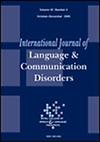Language assessment of Polish-English bilingual children by speech and language therapists who do not speak Polish: A feasibility study of a novel scoring schema for Sentence-Repetition-Tasks
Abstract
Background
The challenge of assessing all languages of multilingual children by clinicians who do not speak the children's heritage languages is a global problem amplified by the increase in recent migration as well as a lack of available assessment tools.
Aim
To evaluate the feasibility of using a novel scoring schema to assist English-speaking speech and language therapists (SLTs) practising in Ireland in scoring Polish Sentence-Repetition (SRep) Tasks in collaboration with Polish language teachers, and to profile and compare children's language performance across their languages using this scoring schema.
Methods and Procedures
LITMUS SRep in English and Polish was completed by 15 typically-developing children (aged 5–8 years) and 12 children with suspected Developmental Language Disorder (DLD) (aged 5–8 years). Scoring of the Polish SRep was completed collaboratively by a monolingual English-speaking SLT and a Polish language teacher and was compared to the scoring completed by Polish linguists.
Outcomes and Results
Findings indicated that the two scoring methods gave comparable outcomes. Individual participants’ performance varied across the Polish and English SRep with some performing better in Polish, some in English and some with a relatively balanced performance across languages.
Conclusions and Implications
Using pre-recorded sentences in conjunction with the novel scoring schema presented in this study has the potential to support SLTs to increase accuracy in diagnosing DLD and reduce both over- and underdiagnosis of multilingual children. Scoring guidelines need to incorporate crosslinguistic influence across languages of bilingual children while clearly outlining language specific clinical markers for DLD.
WHAT THIS PAPER ADDS
What is already known on this subject
- Assessment of multilingual children's language skills and diagnosing Developmental Language Disorder (DLD) is extremely complex due to the heterogeneity associated with their language development. In Ireland, SLTs are largely monolingual English speakers and assessment of heritage languages (HL) is difficult due to a lack of available assessment tools and an increase in the number of languages spoken due to migration. Therefore, investigating ways of multilingual language assessment by monolingual English-speaking clinicians is crucial.
What this paper adds to the existing knowledge
- Language processing tasks have demonstrated their utility and accuracy for language assessment in the research. This is the first study to use Sentence-Repetition (SRep) Tasks for both languages of Polish-English speaking children living in Ireland in which the researcher is a monolingual English-speaking SLT and the SRep Tasks are scored using a novel scoring schema with the assistance of a Polish language teacher.
What are the potential or actual clinical implications of this work?
- SRep Tasks demonstrate the potential to assist in the assessment and diagnosis of DLD in the Polish-English speaking population in Ireland by English-speaking therapists in collaboration with a Polish language speaker. In this way, both the dominant societal language English and the HL Polish can be assessed to increase the accuracy of diagnosis of DLD. This study contributes towards the development of a SRep tool for use clinically by SLTs in Ireland. Further research is needed to create error profiles reflective of the specific Polish-English speaking population in Ireland.


 求助内容:
求助内容: 应助结果提醒方式:
应助结果提醒方式:


